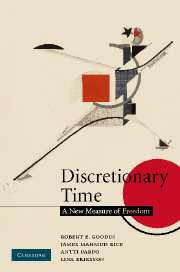Book contents
- Frontmatter
- Contents
- List of figures
- List of tables
- Preface
- Part I Introduction
- Part II Time pressure
- Part III Welfare regimes matter
- Part IV Gender regimes matter
- 10 How gender regimes differ
- 11 A temporal perspective on gender regimes
- 12 Gender regimes and temporal autonomy
- Part V Household regimes matter
- Part IV Conclusions
- Appendix 1 Methodology
- Appendix 2 Data
- Bibliography
- Index
12 - Gender regimes and temporal autonomy
Published online by Cambridge University Press: 28 October 2009
- Frontmatter
- Contents
- List of figures
- List of tables
- Preface
- Part I Introduction
- Part II Time pressure
- Part III Welfare regimes matter
- Part IV Gender regimes matter
- 10 How gender regimes differ
- 11 A temporal perspective on gender regimes
- 12 Gender regimes and temporal autonomy
- Part V Household regimes matter
- Part IV Conclusions
- Appendix 1 Methodology
- Appendix 2 Data
- Bibliography
- Index
Summary
Gender regimes involve a whole lot more than the state's policies with respect to taxes, transfer payments and child-care subsidies. Still, the way in which those policies are gendered is an important if incomplete fact about the gender regime of any given country.
What we have found is that countries differ significantly in their gendering of those policies, and those differences form recognizable patterns. Those patterns fit broadly, but not perfectly, within traditional ‘regime’ categories. Our findings suggest a new set of cross-cutting dimensions that students of gender regimes might want to add to those conventional ones.
In summary form, our findings can be stated as follows:
Women have most temporal autonomy in social-democratic regimes. They have 5 or 6 hours a week more discretionary time there than they do in liberal or corporatist regimes, respectively. Once again, however, that is largely due to factors outside the scope of our study.
In all regimes, women have less temporal autonomy than do men. Generally their discretionary time is less than men's by 2 to 3 hours a week. The outliers – in both directions – are countries conventionally categorized as traditional-conservative ‘corporatist’ regimes (5.5 in France, 0.5 in Germany).
That gender gap would everywhere be greater if it were not for state taxes, transfers and child-care subsidies. By how much differs, however. Liberal regimes reduce the gender gap by over an hour, social-democratic ones by less than half-an-hour. Within the corporatist cluster, countries once again differ.
- Type
- Chapter
- Information
- Discretionary TimeA New Measure of Freedom, pp. 192 - 196Publisher: Cambridge University PressPrint publication year: 2008



